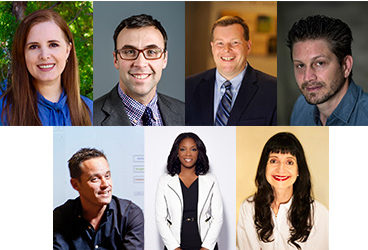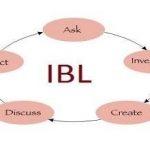“Our global society faces dangers of inequity inside and outside our schools. If we are to realize the peaceful and prosperous vision of the future we desire, a focus on equity through and within our educational systems must be one of our main driving forces.” — Michael Soskil
Welcome to the Fourth Industrial Revolution! It’s a complex, volatile, ever-changing world where we have already witnessed fundamental shifts in the way we live. Given this extraordinary period of societal change, what will this mean for teaching? How should teachers equip learners with the competencies and mindset to approach learning as being life-long? How can education equip learners with agency to shape their own lives and contribute to the lives of their communities?
Six internationally recognized Global Teacher Prize finalists have authored a new book (Teaching in the Fourth Industrial Revolution: Standing at the Precipice; Routledge, March 2018) in which they share their vision and strategies for an education system that matches the needs of the future.
The Global Search for Education is pleased to welcome co-authors Armand Doucet, Jelmer Evers, Koen Timmers, Michael Soskil, Elisa Guerra Cruz and Nadia Lopez.
![]()
“We need to embrace a new paradigm: the networked teacher. We need to build our classrooms, schools and educational systems based on the principles of collaboration and trust.” — Jelmer Evers
How can education lead us through an unknown future to a place of peace and prosperity?
Michael Soskil: Only by keeping education rooted in human relationships and empathy can we meet the great challenges on the horizon. Our students are craving the opportunity to make a difference and shape the planet they will inherit from us. Our global society faces dangers of inequity inside and outside our schools. If we are to realize the peaceful and prosperous vision of the future we desire, a focus on equity through and within our educational systems must be one of our main driving forces. Ever widening inequity will be one of the gravest threats to the health of our future society.
How does a good teacher prepare her students for the Fourth Industrial Revolution?
Nadia Lopez: Teachers must be life-long learners. Teaching is not just about preparing students for a particular workforce, but to also become agents of change that have a positive influence within humanity. When we teach girls that they can be entrepreneurs, architects, computer scientists, and engineers, then we begin to dismantle the stereotypes that limit them from pursuing any and every career. Education can build bridges across the globe and we can learn from one another.
What are some of the key take-aways from your research in Teaching in the Fourth Industrial Revolution with other teachers?
Elisa Guerra Cruz: Children need the artistic touch of human connection to reach their unique potential. Even in environments devoid of technology, excellent pedagogy is still leading to astonishing student learning outcomes. True educational success lies in a system that meets the needs of the individual, with or without the use of technology.
![]()
“Passion is what engages and empowers students. Schools have timetables; learning does not.” — Armand Doucet
You write about the challenges of the Fourth Industrial Revolution requiring a shift to holistic education. What are the steps we must take to accomplish that?
Michael Soskil: We need a shift in focus from accountability measures based on standardized test scores toward metrics that take into account universal access to quality teachers and learning environments, robust curricula that include the arts, as well as student engagement and well-being. Passionate teachers having professional discussions about what is best for kids leads to a better education system. Each individual student is a new independent and constantly changing variable in an ever-changing context.
You talk about “flipping the system” that is changing education from the ground up. How do we do it?
Jelmer Evers: It will take professionalism and also activism by teachers to help build those new systems. We need to embrace a new paradigm: the networked teacher. We need to build our classrooms, schools and educational systems based on the principles of collaboration and trust. We need to be aware as teachers how global forces influence our classrooms. Students need to be invested in what they learn.
You talk about the learner profile (Teach ME) as a practical guide to allow teachers to introduce a holistic approach to learning. What are some of the key drivers?
Armand Doucet: Teachers need to evolve from simply delivering traditional knowledge towards designing lessons that develop literacies, competencies and character. Society needs to be as concerned with the education of our teachers as we are with the education of our students. As educators, our responsibility is not solely to create the next workforce; it is to help raise the next generation of citizens.
![]()
“As the world continues to become more globalized and interconnected, the ability to understand diverse perspectives and work with those that have divergent worldviews will become increasingly important.” — Koen Timmers
True personalization involves more than content being chosen for students by algorithms. A few thoughts on how tech and traditional learning will co-exist?
Armand Doucet: Without great pedagogy, technology integration is worthless. Passion is what engages and empowers students. Schools have timetables; learning does not.
Koen Timmers: Technology is a pedagogical catalyst. It can make good classroom practices great, and it can make bad classroom practices even worse.
What’s the key take away you want other teachers to have from your book?
Koen Timmers: Education is a human right. Everyone, everywhere has a need and the right to quality Education. As the world continues to become more globalized and interconnected, the ability to understand diverse perspectives and work with those that have divergent worldviews will become increasingly important.
Armand Doucet Jelmer Evers: Education should be at the core of any proposed solutions, and teachers must play an integral part in shaping them. Teaching is not an exact science, because, quite simply, humans are involved. Rather than passively wait for history to take its course, or to succumb before the inevitable shifts that come ahead, we want to inspire educators and the society in full to make active decisions and take whatever roads we need so as to guarantee that every child in the world has the opportunity to thrive. As we enter a new age of Renaissance in education, it is key that in each educational jurisdiction, we align our vision to what is truly happening in the classroom.
Top Row L to R: Elisa Guerra Cruz, Armand Doucet, Michael Soskil, Koen Timmers
Bottom Row L to R: Jelmer Evers, Nadia Lopez, C.M. Rubin

